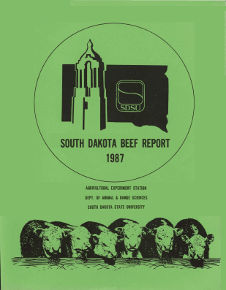Document Type
Report
Report Number
87-14
Publication Date
1987
Keywords
cows, bull exposure, postpartum interval, reproductive performance
Summary
Spring calving beef cows were utilized to study the effect of bull exposure early postpartum on return to estrus and fertility. In the spring of 1985 and 1986, cows were randomly exposed to epididectomized bulls 3 to 7 days after calving until beginning of the breeding season or not exposed to bulls. Cows were observed for estrus twice daily beginning approximately 4 weeks after the start of calving until synchronization. I n 1986, blood samples were collected weekly by jugular venipuncture during heat detection and serum progesterone concentrations were determined. ALL cows were synchronized with Synchro-Mate B and inseminated 48 hours after implant removal. Calves were removed for 48 hours following implant removal. Each year a group of cows was selected from the two treatment groups and cannulated at estrus following Synchro-Mate B implant removal. Blood samples were collected at 15-minute intervals for 2 hours and every 2 hours for 46 hours for determination of luteinizing hormone concentration. Bull exposed cows had a shorter (Pa.09) interval to first estrus in 1985 and there was no difference (P>.05) in 1986. The percentage exhibiting estrus prior to synchronization was greater (P>.01) for bull exposed than nonexposed in 1985 and there was no difference (P>.05) in 1986. There was no difference (P>.05) in conception rates to the timed insemination in 1985 and 1986 and the total percentage pregnant did not differ (P>.05) in either year. Bull exposure may reduce the interval from calving to first estrus and increase the percentage cycling prior to breeding, but conception rates are not influenced.
Number of Pages
3
Type
text
Format
application/pdf
Language
en
Publisher
South Dakota State University
Rights
Copyright © 1987 South Dakota State University
Recommended Citation
Naasz, C.D.; Miller, H.L.; and Haigh, R.H., "Effects of Bull Exposure on Post-partum Interval and Reproductive Performance in Beef Cows" (1987). South Dakota Beef Report, 1987. 15.
https://openprairie.sdstate.edu/sd_beefreport_1987/15

